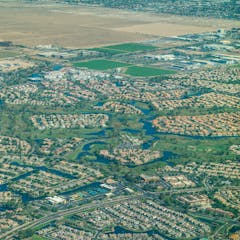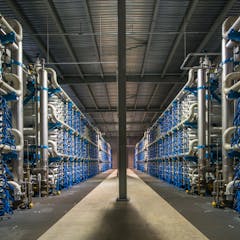
Articles on Desalination
Displaying 1 - 20 of 39 articles

To build drought resilence, Sydney must invest in rainfall-independent water supplies.

Arizona is considering a multibillion-dollar desalination project to address its urgent water needs. Three water experts call for a go-slow approach and point to Israel as a role model.

Around half of US industrial energy use goes toward separating molecules in industrial processes. Developing materials that can withstand harsh industrial conditions can help increase efficiency.

Jordan is planning a major desalination plant on the Gulf of Aqaba – but will it damage nearby marine ecosystems?

Nearly 97% of the world’s water is in the oceans, but desalination is no magic bullet for water-stressed coastal cities.

Drinkable water resources are becoming increasingly scarce. Are technologies such as desalination capable of averting such a crisis?

Australian politicians have a history of opting for high-cost, high-emissions desalination projects. The Queensland government is still wary of using the largely untapped resource of recycled water.

We need a radical rethink of water resource planning. Strategies should include reusing water and moving water physically to water-scarce areas.

Water is central to adapting to climate change, but very few of the strategies put in place to respond to water hazards or ensure its availability have been evaluated.

Desalination can help meet growing water needs globally. But toxic wastewater and inefficiency hamper current techniques. A new approach uses custom membranes to clean water more easily.

Some microbial groups could be using positive energy to influence their metabolism.

The Great Acceleration inaugurated the Anthropocene in the 1950s. Now, a similar race for resources and space is happening in the ocean.

Hitting the Paris targets will go a long way to securing Melbourne’s water supply against future pressure.

Water in Sydney is far cheaper than in Melbourne, and residents take full advantage of it.

Cities relied entirely on conserving and recycling water to get through the last big drought. We now have desalination plants, but getting the most out of our water reserves still makes sense.

Sydney and Melbourne are bringing desalination plants back on stream and Adelaide plans to increase its plant’s output. Perth depends on desalination. But is it the best way to achieve water security?

Pumping very salty water into the ocean has surprisingly little impact on marine life.

Farmers are calling for South Australia to ramp up its desalination plant to free up more water from the Murray Darling.

Every year councils around Australia compete to prove they have the best-tasting tap water in the country.

Global examples show South Africa that desalination could increase water output.

